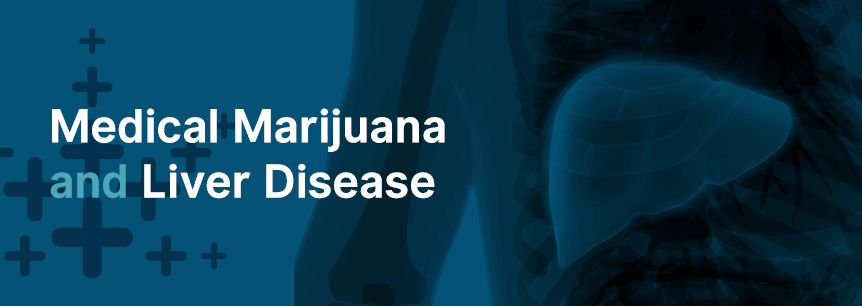
One of your most important organs, the liver, could be helped by medical marijuana in preventing or treating disease. Thanks to current research projects that show links to pot and healing livers, the chances of recovering from an ailing liver are increasing. Also, due to marijuana’s low level of side effects that are generally well tolerated, cannabis could be a future treatment for liver disease patients.
If you currently have liver disease, discuss all possible treatments with your doctor. Marijuana could become a new addition to your liver disease prevention or treatment options.
Cannabis may have several benefits for preventing or treating liver disease:
Find A Doctor Find A Dispensary
The studies on cannabis and liver disease focused on how weed and its components can help with slowing or preventing liver problems rather than treating individual symptoms. Additionally, with liver disease, most people do not experience symptoms until they have cirrhotic livers, which is too late to regain full functioning.
If you are considering cannabis for your liver condition, always talk to your doctor first. Marijuana, though natural, may still interact with other treatments you’re using. Don’t stop any medications your doctor has prescribed, whether traditional or alternative, unless you’ve been given medical clearance to do so. Using marijuana for liver disease needs to be done under the supervision of a physician who also knows any other medications you’re taking.
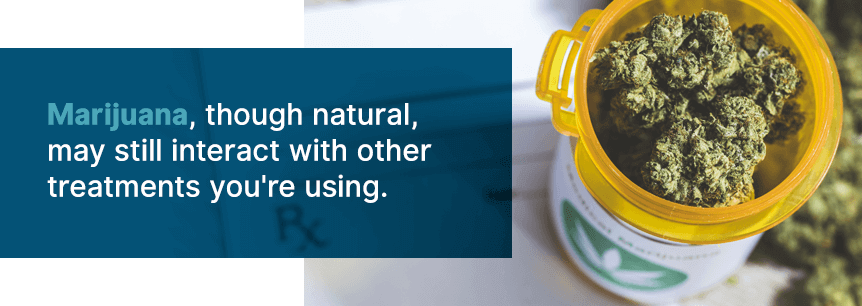
The form of cannabis you use depends on your tolerance and the benefits you want. Because marijuana can ease the pain, reduce nausea and stimulate appetite, it can be useful for those with advanced liver disease alleviate these symptoms.
If you have an autoimmune condition, you might try some of these strains:
If your liver disease has progressed to cirrhosis, consider these strains for your symptoms:
There are many different ways to consume marijuana. Whether you choose to smoke, use a tincture or consume edibles depends on your tolerance. Liver disease or medications you take for it could affect your appetite. Discuss with your doctor about how you wish to use cannabis. This information will make it easier to find the right dosage for your condition and physical build.
Even the most natural of substances can have side effects, marijuana included. Be aware of the possible side effects of cannabis when using it. If you feel concerned about any of these consequences of using weed medically, talk to your doctor first. And if you develop any side effects while using medicinal marijuana, contact your certified cannabis physician first before discontinuing use.
Never stop taking any medicine without letting your doctor know what side effects you’re feeling and why you want to cease using it. Your doctor may recommend a step-down approach to stop marijuana or suggest waiting out the side effects until your body becomes accustomed to them. Your doctor’s advice about marijuana side effects and what you should do about them should be paramount. Do not take advice from anyone other than a medical professional who is familiar with your case.
Side effects vary widely among patients. You may not experience the same reactions as another person, or you may have a milder version. If you take a variety with less THC, you’ll likely experience less of the “high” feeling some associate with using marijuana.
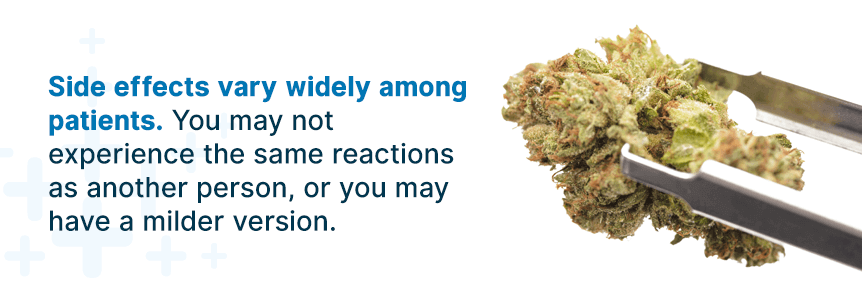
As with all medications, don’t drive or engage in other dangerous tasks until you know how your medical cannabis will affect you. The following may occur when taking medicinal marijuana:
You have options when it comes to your medical treatment. Find a marijuana-certified doctor here at MarijuanaDoctors.com. With the help of an expert in medicine and in recommending cannabis and its effects, you’ll be able to get a full picture of your options for liver disease treatment. Never make a self-diagnosis and treat yourself without talking to a doctor first. The liver is a vital organ that requires consideration before taking any medicine, including marijuana. With a physician in your corner who can help you navigate the various pot strains and options, you can become an advocate for your health.
If you already have a recommendation from a doctor for cannabis, you will need to locate a dispensary convenient to your home. When you visit the dispensary, you’ll have a wide selection of products to fulfill your healthcare needs. If you have concerns about what form or type is best for you, discuss your concerns with the staff at the dispensary, your marijuana doctor or by contacting us.
Find A Doctor Find A Dispensary
Liver disease affects nearly five million adults in the United States. This condition occurs for several reasons. Some you can prevent, while others are conditions you’re born with or unknowingly exposed to. Anything that causes damage to the liver can fall under the banner of liver disease, also known as hepatic disease. Liver disease can start mild, but over time, it can worsen, depending on the cause. Left untreated, it could be fatal.
In a healthy liver, the organ filters out toxins you ingest. These toxins include substances such as alcohol, which is why drinking is linked to liver disease. As a liver condition sets in, the organ becomes inflamed. At this early stage, you may not feel any pain, but if you get prompt treatment, the swelling can go away without permanently damaging the liver.
With inflammation, the liver builds up scar tissue, in a stage called fibrosis. The fibrous scar tissue can reduce your liver’s function, but you can still make a full recovery with the appropriate treatment at this stage.
The next stage, cirrhosis, is when the scar tissue hardens, disrupting the liver’s operations. Though it’s a dire condition and late in the process of liver disease, this is the stage where most people start to exhibit classic symptoms of liver disease. With cirrhosis, you cannot wholly recover your liver’s original functioning. Treatment focuses on preventing the condition from worsening to end-stage liver disease because it cannot be reversed.
End-stage liver disease is the condition when the liver no longer functions. Other parts of the body will also be affected such as the kidneys and the brain. Those with this stage of the condition are prioritized on the transplant list.
Though liver disease has many causes, most forms progress similarly. The condition begins innocuously, with yellowing of the skin and the whites of the eyes. This symptom, called jaundice, is a hallmark of liver problems.
Other signs of a developing liver problem are often similar to those of other chronic conditions. These include nausea, abdominal pain, fatigue, itchiness, swelling of the extremities, pale stool, and dark urine. These are not normal functions of the body. If these symptoms persist for more than a day or two, visit your doctor for a diagnosis.
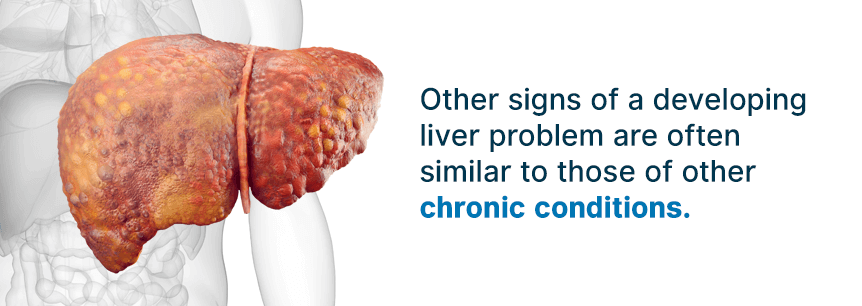
Though often associated with alcoholism, that is not the only cause of liver problems. Many people experience liver disease from birth or after an illness. Several things can cause liver problems including the following:
Left untreated, liver disease progresses through its various stages. Luckily, if diagnosed and treated before cirrhosis sets in, you could make a full recovery and regain complete function of your liver. Regular checkups and blood tests can detect liver problems early, even before you show physical symptoms. Finding the issue early in the course of the disease can result in a better prognosis.
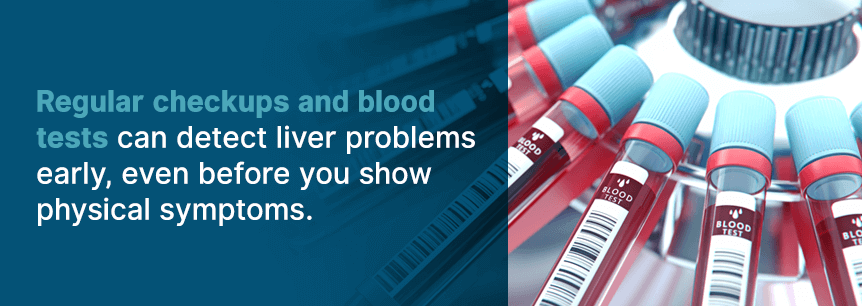
The later stages of cirrhosis and end-stage liver disease can become fatal as more of the liver function is lost. Those who lose most of their liver’s operation and cannot get a transplant will likely die from the condition.
Treatments for liver disease depend on the cause. Doctors try to diagnose and treat liver conditions early when their progression can be halted and sometimes reversed. Here are some of the treatments based on the causes of the liver problem:
Current treatments for liver problems are not without risk. Side effects are inherent with any treatment, but if your doctor recommends a specific medication, they believe the benefits warrant the risk of side effects.
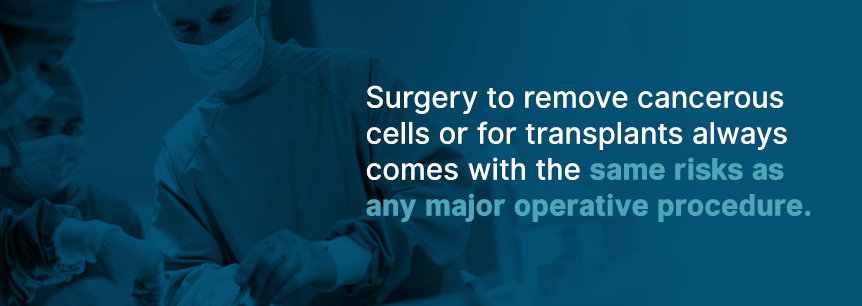


Please allow us to access your location to find local dispensaries.
VIEW ALL DISPENSARIES ➔